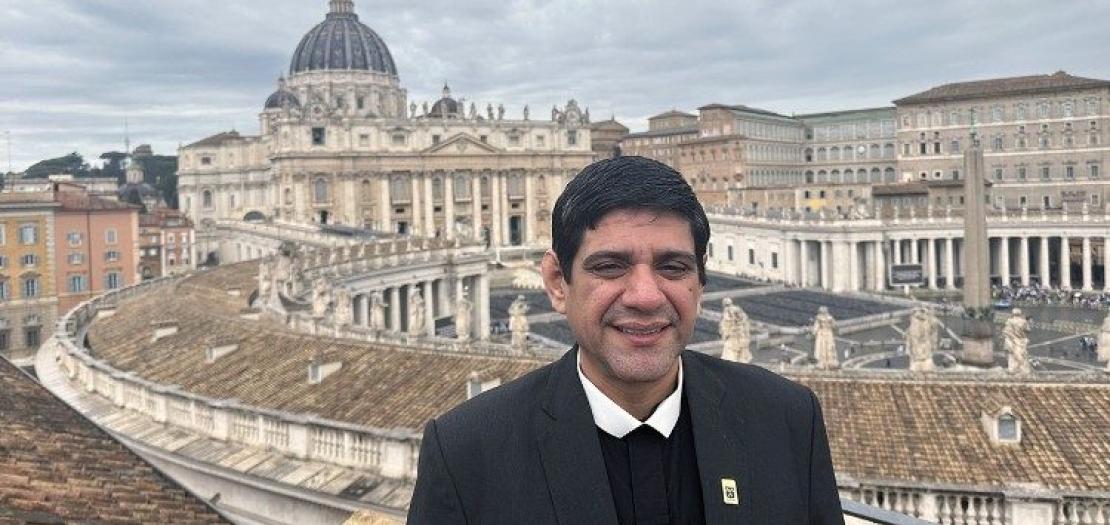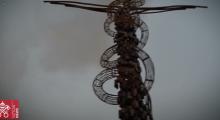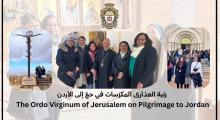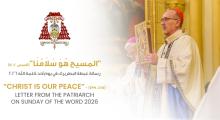Issued by the Catholic Center for Studies and Media - Jordan. Editor-in-chief Fr. Rif'at Bader - موقع أبونا abouna.org

Br. Hernán Santos González during a recent visit to Rome
When Pope St. Paul VI traveled to Palestine in 1964, the first Pope to visit after Saint Peter, which at the time was under the jurisdiction of the Kingdom of Jordan, he observed the precarious living conditions of the population and expressed his desire for two projects to be carried out in their favor.
The first would be the construction of a school for children with hearing and speech impairments, which was later built in Beit Jala under the name 'Effetà' and entrusted to the Dorothean Sisters. The second was the establishment of a Catholic university to educate a new, well-prepared Palestinian leadership.
Eight years later, in a completely changed context following the Six-Day War of 1967, Pope Paul VI's wish was fulfilled: the then Apostolic Delegate, Archbishop Pio Laghi, on behalf of the Holy See, initiated the creation of a Christian university in Bethlehem, entrusting it to the De La Salle Brothers, who had been present in the Holy Land since 1889.
Today, Bethlehem University is a well-established institution that prepares students across a wide range of disciplines: from Tourism, Arts, and Economics to Sciences, Business, Education, and Engineering.
With the Israeli occupation of Palestine, the life of the university has faced countless obstacles and difficulties. Israeli soldiers have shut it down twelve times, but on every occasion, teachers and students were determined not to interrupt their education.
When it was closed for three consecutive years, classes and exams continues in makeshift arrangements in private homes or churches.
Brother Hernán Santos González, FSC, who currently serves as the Vice Chancellor of Bethlehem university, spoke to L’Osservatore Romano about the university’s situation and its resilience in the face of continued tension in the region.
Q: Brother Hernan, what is the current state of Bethlehem University?
Our university currently welcomes over 3,300 students, taught by 100 full-time professors and 112 part-time. A statistic we value greatly is that 78% of the students and 38 per cent of the faculty are women.
Half of our students are from Bethlehem, but 40% come from Jerusalem, and 10 per cent from Hebron and other areas of southern West Bank. About 21 per cent of our students are Christians (almost exclusively Latin Catholics and Greek Orthodox) in a land where, overall, Christians make up only 2 percent of the population. The remaining 79 per cent are of the Muslim faith.
In this regard, I like to highlight two things. First: Social interactions among students are entirely unaffected by religious affiliation, and second, that Muslim students enthusiastically embrace our educational approach, which is firmly rooted in peace and non-violence.
The common thread uniting these cultural and religious differences is the shared desire to resist the unjust military occupation; we don’t hesitate to define ourselves as a 'university of resilience,' peaceful, but resilient.
Q: How has your situation changed after October 7, 2023?
Things have worsened in many ways. First, the economic situation is desperate, which affects the students’ ability to pay tuition fees. You must consider that, alongside the collapse of tourism—which employs many people from Bethlehem—due to the absence of pilgrims, workers in two other important sectors, agriculture and stone and marble quarrying, are also blocked. This is the result of the revocation of about 200,000 transit permits through the separation wall for Palestinian workers.
We try to help our most needy students, but we cannot support everyone. Some have sold their household furniture just to continue eating and studying. We seek to sustain ourselves through donations and with the support from the Holy See’s Dicastery for the Eastern Churches.
For the half of our students who come from outside Bethlehem, passing through checkpoints to reach the university has become problematic, if not impossible. Since October 7, ninety-seven new barriers have been erected around Bethlehem, in addition to the already existing checkpoints.
There is an atmosphere of tension that certainly does not favor studying; the fear is that the conflict might now shift from Gaza to the West Bank, as recent events in Jenin seem to suggest.
Q: Despite all this, are you planning further development of your academic activities?
Yes, I recently presented a five-year plan that envisions the enrollment of an additional 800 students. At the top of our goals is the objective of preventing young people, especially Christians, from leaving, as they are experiencing a significant exodus here in Bethlehem.
Providing them with proper academic training here, rather than abroad, is a decisive antidote to emigration. But to achieve this, we also need the help of Christian communities in the West.







